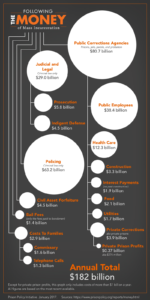In a new report, the Prison Policy Initiative found that mass incarceration costs state and federal governments and American families $100 billion more each year than previously thought.
According to the Bureau of Justice Statistics, the annual cost of mass incarceration in the United States is $81 billion. But that figure addresses only the cost of operating prisons, jails, parole, and probation — leaving out policing and court costs, and costs paid by families to support incarcerated loved ones.
The new report, Following the Money of Mass Incarceration, took a deeper look into the money in mass incarceration, and its findings reveal that private prisons are not the only ones financially invested in keeping millions of people incarcerated in this country. For example, almost half of the money spent on running the correctional system goes to paying staff, who form an influential lobby against criminal justice reform.
Lesser known private players that profit from mass incarceration include bail bond companies, which collect $1.4 billion in nonrefundable fees from defendants and their families; phone companies that charge families up to $24.95 for a 15-minute phone call; and commissary vendors that bring in $1.6 billion a year.
As Vox reports, researchers have found that soaring incarceration rates in the United States have done very little to enhance public safety or reduce crime. That states (who make up the majority of correctional spending), localities, and the federal government nonetheless continue to spend billions every year to warehouse millions of people is a reflection, as the visualization below shows, of “how wide and how deep mass incarceration and over-criminalization have spread into our economy.”
The Prison Policy Initiative found that mass incarceration costs $100 billion more each year than previously thought.
